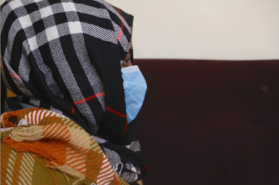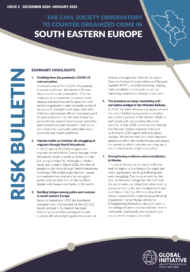Posted on 18 Jun 2020
The Global Initiative Against Transnational Organized Crime supports calls for the release of Nigerien journalist Samira Sabou.
Samira Sabou, a journalist and blogger, was arrested on 10 June in Niamey, Niger’s capital, in a defamation lawsuit brought against her. Sabou is being sued by Sani Issoufou Mahamadou, son of the president of Niger and a presidential advisor, over a Facebook post.
On 26 May, in the post, Sabou, whose work has been critical of Niger’s government, linked the president’s son to a case of alleged overbilling by Niger’s defence ministry. Sabou is president of the Association of Bloggers for Active Citizenship and manager of a Niger news website, Mides-Niger. She also runs a Facebook page with over 60 000 followers. Despite her involvement in spreading awareness of the case, Sabou did not name the president’s son in the post for which she is being sued.
An audit of the ministry revealed embezzlements of large sums of money intended for purchasing military equipment. Soldiers in the country often complain about insufficient supplies of ammunition and equipment while being tasked with combating terrorist groups.
According to one provisional report, the misappropriation of funds amounted to a loss of 76 billion CFA francs (around €115 million) from the public coffers between 2017 and 2019. The fraud sparked a protest on 15 March in which civil-society groups, already confronted with the state’s repressive measures, took to the streets to demand transparency and a full investigation into the allegations. Following clashes with the police, seven activists were arrested, of whom at least three are still incarcerated.
Sabou faces up to three years in prison due to recent changes made to Nigerien law. In 2019, Niger passed a law that allows ‘suppression of freedom’ – this according to Sabou’s lawyer. The new cyber-crime law provides for offenders to be sentenced to between six months and three years for online defamation. It is a change in the statute, however, that would appear to contravene article 67 of Niger’s 2010 press law, which prohibits imprisonment for media-related offences. On 29 May, Niger adopted another law, which allows the presidency to intercept phone calls. This new law has been framed by the state as a means to ‘fight terrorism and transnational organized crime’, but will clearly impede the freedom of expression of journalists like Samira Sabou.
Ranking bottom out of 189 countries in the UNDP Human Development Index for the past few years, Niger’s combination of poverty and location in the Sahel has fuelled an environment that has attracted organized crime. Organized crime is widely prevalent in Niger in various forms. The country has become a node for trafficking drugs, arms and people along a number of trans-Sahelian illicit trade routes. The country is also impacted by jihadi-related insecurity. (For more information about Niger’s connection to organized crime, see https://globalinitiative.net/wp-content/uploads/2019/11/After_the_storm_GI-TOC.pdf and https://globalinitiative.net/the-human-conveyor-belt-broken-2/.)
Organized crime in Niger has been recognized as being closely intertwined with political actors, and many claim that President Mahamadou Issoufou’s rise to power is in part connected to alliances with actors who have a foot in the illicit economy.
Earlier this year, the president announced that 2020 will be an electoral year in Niger. Following the arrest of Issoufou’s rival, Hama Amadou, shortly before the last elections in 2016, the recent repressive measures and crackdowns on dissenting voices like those of Samira Sabou may further polarize political actors.
Organizations including Reporters Without Borders (RSF) and Amnesty International have stated that Sabou has committed no crime and should be released. The Global Initiative agrees with this position, and sees this case as clear injustice. We are therefore joining the call for the release of Samira Sabou, who is a talented and committed journalist with whom we have a professional relationship through the ENACT programme. Her contributions to an open public debate have been relevant in a context where spaces for these discussions are shrinking.
This blog represents the views of the Global Initiative Against Transnational Organized Crime. It was drafted by Milos Jakovljevic



